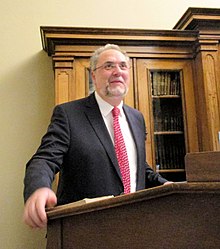Michele Camillo Ferrari
Michele Camillo Ferrari (born May 11, 1964 in Bellinzona ) is a Swiss Middle Latin philologist .
Life
Michele C. Ferrari comes from a family that has belonged to the local patriarchy in the municipality of Lodrino since the 15th century and from which various personalities such as the founding member of the Ticino Gran Consiglio (cantonal parliament) Martino Ferrari (1746-1822) and the lawyer and politician Franco Ferrari (1924–2014). After graduating from high school in Bellinzona in 1983, which was awarded the Rotary Prize, and a language stay in Oxford from 1983 to 1984, he studied Latin Philology of the Middle Ages and Modern Era, Classical Philology and Medieval and Modern History in Heidelberg and Cologne . In 1992 he received his doctorate summa cum laude from Walter Berschin in Heidelberg . This was followed by a period as a researcher for the Swiss National Science Foundation (SNSF) at the École des hautes études en sciences sociales and at the Institut de recherche et d'histoire des textes in Paris from 1993 to 1994, until Peter Stotz brought him to Zurich as an assistant. Here he completed his habilitation in 1998 for the subject of Latin Philology of the Middle Ages and Modern Times with a thesis on Hrabanus Maurus and the Carolingian culture. In 2000 he belonged to the first cohort of SNSF professors, and in 2002 he was appointed Professor of Medieval and Modern Latin Philology at the Friedrich-Alexander-Universität Erlangen-Nürnberg as successor to Peter Christian Jacobsen . In 2008 he refused a call back to Zurich.
He was visiting professor at the Ecole des hautes études en sciences sociales, visiting lecturer in Zurich, Berno and seminar leader at several universities worldwide.
Since 2007 he has headed the international graduate program SCRIPTO (Scholarly Codicological Research, Information & Palaeographical Tools), which is dedicated to the further training of young medievalists and early modern scholars and, among other things, regularly offered elite summer courses in the St. Gallen Abbey Library (palaeography), in the Nuremberg City Library (book illumination) and the Herzog August Library in Wolfenbüttel (digital manuscript cataloging).
In 2008 he was elected a corresponding member of the Reial Acadèmia de Bones Lletres in Barcelona, and in 2016 he was elected a member of the Academy of Charitable Sciences in Erfurt .
He is a member of the Scientific Commission " German Inscriptions " at the Heidelberg Academy of Sciences and since 2016 Deputy Chairman of the Advisory Board "Medieval Tradition" at the Bavarian Academy of Sciences in Munich.
Ferrari was a founding member of the Zurich Medieval Studies Competence Center, the Erlangen Old World Center and the newly established Erlangen Interdisciplinary Center for Medieval and Renaissance Studies (IZEMIR), of which he was a long member. From 2003 to 2005 he was on the advisory board of the Medievalist Association , and from 2005 to 2009 he took over the position of Vice President of this association. As a member, he is also a member of other organizations such as the Classical Association , the Società internazionale per lo studio del medioevo latino in Florence and the Société des antiquaires de France .
Ferrari is a member of the Scientific Advisory Board and the editorial team of several scientific journals and series (Atene y Roma; Bibliologia; Italia medievale e umanistica; Scrittori latini dell'europa medievale; Collationes, Studi sul pensiero tardo-antico, medievale e umanistico; FAU studies of Philosophical Faculty).
He has supervised exhibitions in Rome (Il volto di Cristo, section “Volto Santo”, 2000) and the Germanic National Museum in Nuremberg (Die Gumbertusbibel, 2014).
For many years he has also worked as a concert and opera critic, mostly for the Berlin Opera blog.
Writings as author and (co-) editor (selection)
- Sancti Willibrordi venerantes memoriam. Echternach scribes and writers from the Anglo-Saxons to Johann Bertels. An overview. CLUDEM, Luxembourg 1994. ISBN 2-919979-03-5
- Thiofridi abbatis Epternacensis Flores epytaphii sanctorum. Turnhout, Brepols 1996, ISBN 2-503-04331-3 ( Corpus Christianorum , Continuatio mediaevalis. Vol. 133).
- Il "Liber sanctae crucis" di Rabano Mauro. Testo, immagine, contesto. Peter Lang, Bern et al. 1999, ISBN 3-906762-17-3 (Latin language and literature of the Middle Ages. Vol. 30).
- Ernst August Evers, On school education for bestiality. A pamphlet in favor of humanistic education. Manutius Verlag, Heidelberg 2002. ISBN 3-925678-95-6 .
- Johann Caspar von Orelli, Vita di Dante. Armando Dadò, Locarno 2005, ISBN 88-8281-160-3 (Collana Pro Grigioni italiano. Vol. 10).
- Vil guote books about Sant Oswalden. The parish library in Zug in the 15th and 16th centuries. Chronos Verlag, Zurich 2003. ISBN 3-0340-0665-9 .
- The Gumbertus Bible. Golden imagery of the Romanesque, Germanisches Nationalmuseum, Nuremberg 2014. ISBN 978-3-936688-85-6 .
- Saints and the City. Contribution to the understanding of urban sacredness in Christian communities. FAU University Press, Erlangen 2015. ISBN 978-3-944057-29-3 .
- Parishes in the premodern. Identity and Culture in the Lower Churches of Europe, Harrassowitz Verlag, Wiesbaden 2017. ISBN 978-3-447-10488-3 .
- Europe 1215. Politics, culture and literature at the time of the IV Lateran Council, Böhlau, Cologne 2018. ISBN 3-412-50381-9 .
List of publications: www.mittellatein.phil.fau.de/lehrstuhl/lehrstuhlteam/prof-dr.michele-c.ferrari
Web links
- Literature by and about Michele Camillo Ferrari in the catalog of the German National Library
- Publications by Michele C. Ferrari in the Opac der Regesta Imperii
- Michele C. Ferrari on the website of the University of Erlangen-Nuremberg
Individual evidence
- ↑ SCRIPTO / Further Education ›Latin Philology of the Middle Ages and Modern Times. Retrieved on July 23, 2020 (German).
- ^ Opera Lounge - The somewhat different opera magazine. Passionate and independent. Retrieved on July 23, 2020 (German).
| personal data | |
|---|---|
| SURNAME | Ferrari, Michele Camillo |
| ALTERNATIVE NAMES | Ferrari, Michele C. |
| BRIEF DESCRIPTION | Swiss Middle Latin philologist |
| DATE OF BIRTH | May 11, 1964 |
| PLACE OF BIRTH | Bellinzona |
